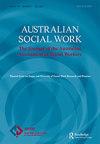The Non-Indigenous Educator Teaching Australian Aboriginal Content in Social Work Education
IF 2
3区 社会学
Q2 SOCIAL WORK
引用次数: 1
Abstract
ABSTRACT Social work in Australia requires educators to teach skills, knowledge, and Aboriginal ways of knowing, doing, and being to ensure graduates are culturally responsive and potential allies when working with Aboriginal peoples and communities. This education should include an accurate teaching of Australian Aboriginal history and sharing of Aboriginal knowledge. Currently, non-Aboriginal educators are more likely to teach Aboriginal content, which can foreclose opportunities for Aboriginal educators. On the surface this appears to be a continuation of colonialism where white privileged groups speak for, speak about, and occupy, in this instance, the educational spaces related to Australian Aboriginal peoples and other minority racial groups. This occupation of the educational space in social work is an interesting predicament when considering whether social work educators are allies to the processes of decolonisation. This article explores the experiences of non-Aboriginal educators and asks the question—how do we decolonise social work to create culturally responsive practitioners? IMPLICATIONS Universities need to be aware of and address the continuation of colonising practices in teaching Aboriginal and Torres Strait Islander content. There is the potential to create a transformative future in social work education with the sharing of two world views.非土著教育工作者在社会工作教育中教授澳大利亚土著内容
摘要澳大利亚的社会工作要求教育工作者教授技能、知识和原住民的认识、行为和存在方式,以确保毕业生在与原住民和社区合作时具有文化响应能力和潜在盟友。这种教育应包括准确教授澳大利亚原住民历史和分享原住民知识。目前,非原住民教育工作者更有可能教授原住民内容,这可能会剥夺原住民教育工作者的机会。从表面上看,这似乎是殖民主义的延续,在这种情况下,白人特权群体代表、谈论并占据与澳大利亚原住民和其他少数种族群体有关的教育空间。当考虑到社会工作教育工作者是否是非殖民化进程的盟友时,这种对社会工作中教育空间的占用是一个有趣的困境。本文探讨了非原住民教育工作者的经历,并提出了一个问题——我们如何将社会工作非殖民化,以培养具有文化响应能力的从业者?启示大学在教授原住民和托雷斯海峡岛民内容时,需要意识到并解决殖民主义做法的延续问题。通过分享两种世界观,有可能在社会工作教育中创造一个变革性的未来。
本文章由计算机程序翻译,如有差异,请以英文原文为准。
求助全文
约1分钟内获得全文
求助全文
来源期刊

Australian Social Work
SOCIAL WORK-
CiteScore
4.20
自引率
16.70%
发文量
37
期刊介绍:
Australian Social Work is an international peer-reviewed journal reflecting current thinking and trends in Social Work. The Journal promotes the development of practice, policy and education, and publishes original research, theoretical papers and critical reviews that build on existing knowledge. The Journal also publishes reviews of relevant professional literature, commentary and analysis of social policies and encourages debate in the form of reader commentary on articles. Australian Social Work has grown out of the Australian context and continues to provide a vehicle for Australian and international authors. The Journal invites submission of papers from authors worldwide and all contributors are encouraged to present their work for an international readership.
 求助内容:
求助内容: 应助结果提醒方式:
应助结果提醒方式:


